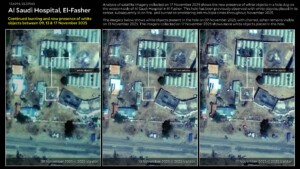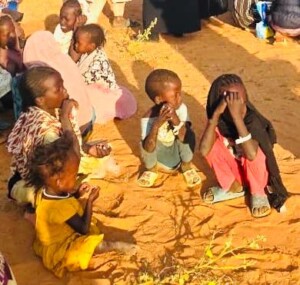‘IMF figures on Sudan inadequate; economy imploding’: analyst
The International Monetary Fund (IMF) and the World Bank have failed to present a full or accurate picture of Sudan’s economic situation in particular about the government’s military and security expenditures. “There is in the July 2014 IMF report not a single line item – not one – reflecting or indicating the scale of military and security expenditures. We may learn about “Regulatory capital to risk-weighted assets”; but we will learn nothing about investments in weapons acquisitions from abroad or the growing domestic armaments production. We learn nothing of salaries and logistical expenditures for the Sudan Armed Forces or the militias the government supports,” Sudan researcher and analyst Dr Eric Reeves says in his latest report, “Watching the Bubble Burst, Political Implications of Sudan’s Economic Implosion”, published by the US advocacy organisation Enough on 26 September. “Since the Government of Sudan – essentially the National Congress Party (formerly the National Islamic Front) – is deeply threatened by a fuller understanding of the dire straits in which the economy currently lies, it has an obvious interest in doing what it can to minimise popular understanding of growing economic threats, and in particular the excessive budgetary commitments to the Sudan Armed Forces, various security forces, and militias,” Reeves states. “Gross Domestic Product (GDP) is yet another figure that depends upon what Khartoum wishes the world to believe; its relationship to actual national economic production is unclear, especially when military and security expenditures have been excluded or lumped underneath the rubric “other”. These expenditures have been consistently and vastly underestimated by the IMF, an instance of culpable credulity in light of the number of informed observers of Sudan who believe that these expenditures account for more than half of the national budget. The Government of Sudan has long been deceitful in its account of these expenditures, and the consequences for a calculation of true GDP are enormous.” International intervention Reeves warns for an implosion of the Sudanese economy, pointing to the extremely high inflation, the exceedingly little foreign exchange currency (Forex), and the country’s massive external debt, which according to the IMF stood at US46.9 billion in August. “The current Government of Sudan has no way to respond to both increasing political pressures and the consequences of a rapidly deteriorating economy. As a result, it will almost certainly resist change, with violent repression, for as long as possible; for many of its leaders have been or will be the subject of arrest warrants for crimes against humanity by the International Criminal Court, and will have no recourse or avenue of escape once the government falls. They are as a consequence especially dangerous, and the fall of the regime may well be very bloody.” Reeves therefore urges the international community to develop plans on “how to assist in the creation of a democratic, inclusive, and secular Government of Sudan.” International actors ”should be prepared to address some of the most immediate problems, including widespread food insecurity”. “[..] without at least the cooperation of the Europeans and enhanced efforts by the United States, the brutal men in Khartoum will continue to enjoy the days of tyranny remaining to them,” the analyst stresses. Targeted sanctions –directed at President Al Bashir, Vice-President Bakri Hassan Saleh, Minister of Defence Abdel Rahim Mohamed Hussein, former national security head Saleh Gosh, former Presidential Advisor Nafie Ali Nafie, and a number of other officials and senior army officers– “would serve not only as a warning to others who might reflect on the wisdom of becoming complicit in atrocity crimes, but would weaken these men politically as well as strip them of assets that belong to the people of Sudan,” Reeves recomments in his report. Initiatives The American lobbyists of Enough announced the launch of two initiatives based on Reeves’ report: An Enough Forum where expert commentary will be solicited on key issues related to the Horn, East and Central Africa; and a series of reports and investigations into the economic roots of conflict and crisis in Sudan and South Sudan. In June this year, Enough started a lobby campaign among influential American politicians to hit the government of Sudan financially by “going after the stolen wealth of the regime’s elite”. The founders of the Satellite Sentinel Project said that they would pursue a forensic investigation, to “expose the financing mechanisms” of the ruling National Congress Party. File photo: An eggs vendor waiting for customers at a market in Khartoum (Mohamed Nureldin Abdallah/Reuters) Related:Prof: ‘Cost of Darfur war estimated at $50 billion’ (24 September 2014) US lobby to hit Sudan government financially (12 June 2014)
The International Monetary Fund (IMF) and the World Bank have failed to present a full or accurate picture of Sudan’s economic situation in particular about the government’s military and security expenditures.
“There is in the July 2014 IMF report not a single line item – not one – reflecting or indicating the scale of military and security expenditures. We may learn about "Regulatory capital to risk-weighted assets"; but we will learn nothing about investments in weapons acquisitions from abroad or the growing domestic armaments production. We learn nothing of salaries and logistical expenditures for the Sudan Armed Forces or the militias the government supports,” Sudan researcher and analyst Dr Eric Reeves says in his latest report, “Watching the Bubble Burst, Political Implications of Sudan's Economic Implosion”, published by the US advocacy organisation Enough on 26 September.
“Since the Government of Sudan – essentially the National Congress Party (formerly the National Islamic Front) – is deeply threatened by a fuller understanding of the dire straits in which the economy currently lies, it has an obvious interest in doing what it can to minimise popular understanding of growing economic threats, and in particular the excessive budgetary commitments to the Sudan Armed Forces, various security forces, and militias,” Reeves states.
“Gross Domestic Product (GDP) is yet another figure that depends upon what Khartoum wishes the world to believe; its relationship to actual national economic production is unclear, especially when military and security expenditures have been excluded or lumped underneath the rubric "other". These expenditures have been consistently and vastly underestimated by the IMF, an instance of culpable credulity in light of the number of informed observers of Sudan who believe that these expenditures account for more than half of the national budget. The Government of Sudan has long been deceitful in its account of these expenditures, and the consequences for a calculation of true GDP are enormous.”
International intervention
Reeves warns for an implosion of the Sudanese economy, pointing to the extremely high inflation, the exceedingly little foreign exchange currency (Forex), and the country’s massive external debt, which according to the IMF stood at US46.9 billion in August.
“The current Government of Sudan has no way to respond to both increasing political pressures and the consequences of a rapidly deteriorating economy. As a result, it will almost certainly resist change, with violent repression, for as long as possible; for many of its leaders have been or will be the subject of arrest warrants for crimes against humanity by the International Criminal Court, and will have no recourse or avenue of escape once the government falls. They are as a consequence especially dangerous, and the fall of the regime may well be very bloody.”
Reeves therefore urges the international community to develop plans on “how to assist in the creation of a democratic, inclusive, and secular Government of Sudan.” International actors ”should be prepared to address some of the most immediate problems, including widespread food insecurity”.
“[..] without at least the cooperation of the Europeans and enhanced efforts by the United States, the brutal men in Khartoum will continue to enjoy the days of tyranny remaining to them,” the analyst stresses.
Targeted sanctions –directed at President Al Bashir, Vice-President Bakri Hassan Saleh, Minister of Defence Abdel Rahim Mohamed Hussein, former national security head Saleh Gosh, former Presidential Advisor Nafie Ali Nafie, and a number of other officials and senior army officers– “would serve not only as a warning to others who might reflect on the wisdom of becoming complicit in atrocity crimes, but would weaken these men politically as well as strip them of assets that belong to the people of Sudan,” Reeves recomments in his report.
Initiatives
The American lobbyists of Enough announced the launch of two initiatives based on Reeves’ report: An Enough Forum where expert commentary will be solicited on key issues related to the Horn, East and Central Africa; and a series of reports and investigations into the economic roots of conflict and crisis in Sudan and South Sudan.
In June this year, Enough started a lobby campaign among influential American politicians to hit the government of Sudan financially by “going after the stolen wealth of the regime’s elite”. The founders of the Satellite Sentinel Project said that they would pursue a forensic investigation, to “expose the financing mechanisms” of the ruling National Congress Party.
Related:
Prof: 'Cost of Darfur war estimated at $50 billion' (24 September 2014)
US lobby to hit Sudan government financially (12 June 2014)











 and then
and then